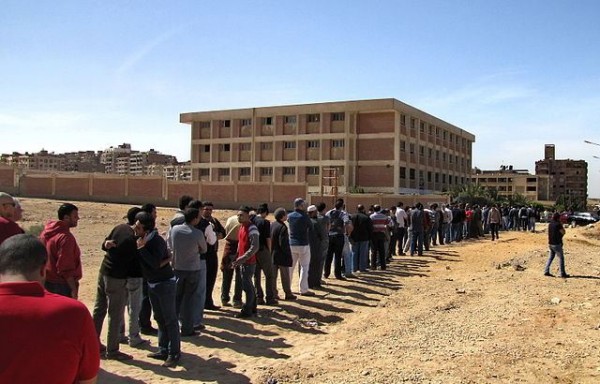State media in Egypt are reporting that the new constitution has been approved potentially by around 64% of voters but it is not without its critics who are concerned about a lack of protection for human rights. Women’s groups and religious minorities are especially concerned.
The referendum itself was only able to go ahead after voting was adjusted to take place over two weekends rather than one because half of the country’s judges refused to supervise the process, a legal requirement under the terms of the referendum. The Judges Club cited a lack of security at polling stations and counting offices as their reason for withdrawing their support in the light of several violent protests both for and against the constitution.
Among the difficulties that the constitution poses for Egyptians is the lack of an explicit protection of women’s rights and explicit respect for Sharia which treats men and women differently. The women’s committee of the Egyptian Social Democratic Party said that not including articles on women’s rights in the constitution opens up the possibility of legal changes to the rights of women in education, work and personal status laws.
Freedom of religion is also neglected by the constitution that guarantees the freedom to practice and establish places of worship for Muslims, Christians and Jews, but excludes other groups in the country such as the Egyptian Baha’is.
Under the new constitution freedom of expression is also unclear. According to Human Rights Watch:
Article 45 protects freedom of expression without stating what legitimate limitations are permissible and how to balance this right against article 31, which states that, “The individual person may not be insulted,” and article 44 prohibiting “the insulting of prophets.” Articles 31 and 44 are not legitimate limitations on freedom of expression under human rights law, and they would appear to make difficult, if not impossible, any meaningful reform to existing penal code provisions that criminalize “insult” and defamation, provisions frequently used in the past to prosecute critics of the government. Criminal prosecutions on charges of “insulting the president” or “insulting the judiciary” have increased since Morsi took office.
Potentially, the most worrying aspect of this new constitution though is the lack of progress on diluting the strength of the Military in Egypt. For decades the military has been in charge of the country and it was the abuses and corruption of the military rulers, coupled with sky-high unemployment levels among young people who are more highly educated than ever before and with more access to communication technology, that led to the revolution and ousting of Mubarak in 2011.
Under this new constitution the military still has the right to try civilians in military courts, the defence minister would be chosen from military ranks, and the military budget would not be open to parliamentary scrutiny.
At least one positive item in the new constitution from the point of view of democratic reform is the limitation of two four-year terms for future presidents and this should prevent another Mubarak from appearing in the future.
Western media are portraying this new constitution as the work of the Muslim Brotherhood to turn the country into a state under strict sharia law, thereby trying to strike fear into the hearts of the mostly Christian democracies of the West. But sharia depends on the interpretation and there is no agreement on a sharia legal system among Islamic states, going from the violent and murderous systems in Iran and Saudi Arabia, to the more relaxed examples of Jordan and other countries which restrict sharia to more minor family issues alongside a common law and civil law code.
The low turn-out of 33% for the referendum shows that the boycott by several political groupings seems to have worked. Human Rights observers, not to mention the people of Egypt, will watch nervously to see what the future holds for Egypt in the next years with this new system and how it will affect their economy and their obligations to the international treaties to which Egypt is a signatory.
However, the people and especially the women on the street in Tahrir Square were fighting for a new system and a new constitution. They were fighting for the opportunity to have jobs and enjoy the human rights given to them under the Universal Declaration of Human Rights. This constitution will not fulfil those aspirations.






